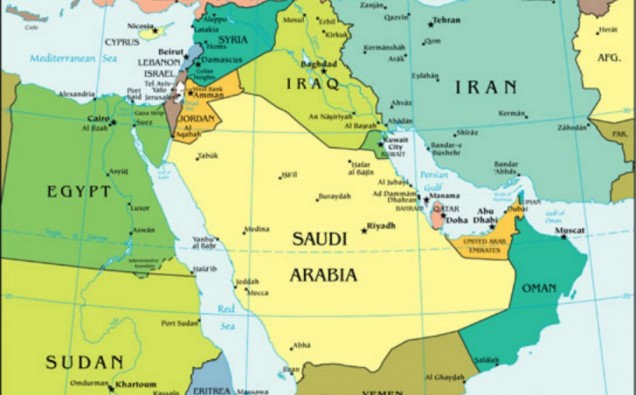
The unfolding crisis between Saudi Arabia and Iran – over execution of a prominent Saudi Shiite cleric –threatens to be yet another disconnect in the way of resolution to multiple Middle Eastern conflicts including deadly Syrian civil war, which has claimed more than 250,000 lives and displaced millions.
The sudden breakdown in diplomatic relations between the two major players will escalate regional tensions and may deeply hurt the fight against ISIS or Deash in the region, already torn along sectarian, political and strategic lines.
Riyadh’s pullout of Saudi diplomats and suspension of relations followed Iranian protestors’storming and burning part of the Saudi embassy in Tehran on Sunday. In an ominous exacerbation on Monday, Bahrain and Sudan severed their diplomatic ties with Tehran while the United Arab Emirates has downgraded bilateral diplomatic relations. The repercussion could stalemate a planned Washington-Moscow endorsed political solution to the Syrian imbroglio. The regional escalation may also affect oil prices, and significantly impact stock markets around the world.
The execution of Sheikh Nimr Baqr al-Nimr, a critic of Riyadh’s policies and supporter of sectarian harmony – has drawn widespread international concern. Both Riyadh and Tehran deny freedom of expression and other key democratic rights to their people and carry out hundreds of executions each year but the execution of Sheikh Nimr has set off a political storm since it is being seen as politically motivated.
While Saudi Arabian and Iranian officials have not so far publicly disowned any international peace effort for Syria, leaders around the world are alarmed at the sudden escalation between the two countries that have long stayed poles apart on a range of issues.
Given their stark rivalry, both Riyadh and Tehran are likely to further harden their positions on issues like the fate of Bashar al Assad in future Syria and cast a long shadow over a long-awaited UN-led initiative on ending the bloody Syrian conflict. The two countries also have known divergence of interests in Yemen, Iraq and Bahrain, and last year’s nuclear agreement between Iran and major powers also heightened Riyadh’s security calculations.
In Washington, officials are concerned about the fallout of the latest bout between Riyadh and Tehran, as experts say a spiraling situation could harm a united effort against ISIS and overturn prospects of a political solution to Syrian civil war.
“We are particularly concerned that the execution of prominent Shia cleric and political activist Nimr al-Nimr risks exacerbating sectarian tensions at a time when they urgently need to be reduced. In this context, we reiterate the need for leaders throughout the region to redouble efforts aimed at de-escalating regional tensions,” State Department spokesman John Kirby said.
The Arab world has been wrecked by a regional turmoil since the inception of the Arab Spring of revolutions that pitched democracy-seeking citizens against entrenched strongman establishments.The status quo powers – from Egypt to Syria – have inflicted much bloodletting on their own citizens, as they seek to perpetuate superficial stability through suppression of the people’s aspirations and political dissent.
The world response to the Middle Eastern imbroglio and spreading militancy has also been inexplicable. Indeed, clash of national interests among major players, lack of empathy and contrariness of priorities on display on the international horizon, make ME peace a distant dream. It was after Obama Administration’s much diplomatic work that Washington and Moscow were able to agree to an initiative for a political solution to multi-layered conflict.
Meanwhile, the ISIS or Daesh, a terrorist organization emerging from the ruins of 2003 Iraq war and the ongoing Syrian calamity, Assad’s continued reign of state terror and an unending refugees crisis have collectively resulted in precarious implications for world peace.
It is now crystal clear from repercussions of Iraq war and terrorist violence – from Afghanistan and Pakistan to Iraq and Syria and from Paris to San Bernardino – that the whole world is like a big ship, and that a hole on one end would sooner or later endanger all aboard.
Yet, the international response to violent extremism and Iraq-Syria conflagration has been oscillating between knee-jerk political reactions to disjointed military actions like the multiple campaigns against the ISIS or Da’esh in Syria and Iraq. In Libya, the world forms an alliance to deal with a bloody civil war, while Syria is left to its machinations. The post-war Iraqi and continuing Afghan predicaments – though due to varied reasons – also instruct that over-reliance on military actions does not always work. A 1990s like retreat from Afghanistan and a hands-off approach to Iraq-Syria are not options any more, while flash points like UN-recognized Palestine and Kashmir disputes also linger on.
The new realities of globalization, interdependence and interplay of the marketplace of ideas and sustainable economic development demand a much clearer holistic vision for peace and stability in the Middle East.
In a broader perspective the fight against extremist violence demands that the Western powers, oil-rich Gulf countries and Asian giants including China and Japan help war-torn Middle Eastern countries and Afghanistan with economic development. Look at how international embrace has turned Vietnam into a hub of trade and investment from being a theater of war.
But ultimately, it is the Muslim countries that have to own and clear their mess in order to determine their destiny. The question facing much of the Muslim world is if and when violence-hit countries would resolve their own political and security troubles through introduction of reforms and inclusive narratives. These two measures must counter violence and bring long-denied democratic, economic and political freedoms to the masses – the root-cause of turmoil hitting the region.
Tunis, the birthplace of the Arab Spring, with the success of its Ennahda renaissance movement, achievement of a pluralist democracy and peaceful democratic transition, offers a model to emulate.













